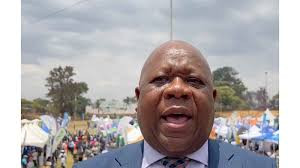
THE Reserve Bank of Zimbabwe (RBZ) has ordered National Patriotic Front (NPF) spokesperson, Jealousy Mawarire to retract utterances he made at a public debate that the central bank was involved in illicit money deals with a company owned by President Emmerson Mnangagwa’s son or face a $10 million lawsuit.
By Everson Mushava
Last week, while addressing a Zimbabwe Electoral Support Network (Zesn) debate series titled Making Elections Make Sense, Mawarire alleged that illegal foreign currency traders were receiving money from Spartan Investments owned by Mnangagwa’s son Tarirai David.
Through its lawyer, Gerald Mlotshwa, the RBZ has demanded that Mawarire retract his utterances or face a lawsuit.
“It is a matter of record that you stated, not alleged, that a private company Spartan Investments, belonging to the President’s son had an RTGS account with the RBZ. You further stated that it was through, and another company, Makanaka Investments, that the RBZ was engaged in the black market trading of the United States dollar,” he wrote. Mlotshwa also demanded Mawarire to bring about evidence of transactions by the RBZ regarding that matter.
“Our client’s instructions are that you should provide us, and the general public, with this information before 12 noon, Wednesday 2, 2018.”
Mlotshwa added: “It is manifest, from your statement, and further comments on your Twitter account that this information exist and that you have these details at hand. “In the event of your failure to do so, and taking account of the reckless and irresponsible nature of your statements, our client will institute the necessary legal action to claim US$10 million as damages from yourself.”
In his presentation, Mawarire said traders were receiving cash as well as electronic money through RBZ from Spartan Investments, which he claimed is owned by Mnangagwa’s son. He also claimed that the other company, which was providing the illicit funding was Makanaka Investments owned by Antony Clever Pote from Zvishavane.
- Chamisa under fire over US$120K donation
- Mavhunga puts DeMbare into Chibuku quarterfinals
- Pension funds bet on Cabora Bassa oilfields
- Councils defy govt fire tender directive
Keep Reading
Mawarire later used social media to share documents which he claimed “are snippets of the Spartan Investments docket” at the Zimbabwe Anti-Corruption Commission (Zacc).
But Mawarire in his response to Mlotshwa, threatened to disclose more information regarding the illicit deals which he said were well documented. He said Mlotshwa’s threats were baseless.
“However, as a matter of fact, the Reserve Bank has been central in the creation of the current liquidity and monetary situation. For instance, contrary to the law and normal banking standards, the central bank has allowed central government to run an overdraft facility with it,” he wrote.
“This overdraft facility was meant to finance the huge fiscal demands and uncontrolled expenditure of central government. By allowing this overdraft facility, your client, who, in any event, is under-capitalised, was then forced to unlawfully dip their huge hands into normal RTGS and nostro balances kept by the banking sector.”
Mawarire said it was the RBZ that should apologise to the people of Zimbabwe.
“The management of the country’s economy is surely a public matter that affects every citizen. Neither your client, nor anyone else, has a right to muzzle free speech on an important matter as the economy,” he added.
“I would like to assure you that, while I spent two minutes talking about the RBZ and the cash crisis at the Zesn public forum, I will definitely spend more time on the subject in our next political rallies to make sure the public appreciates the extent of the damage your client’s unlawful actions have done to the economy, the banking sector and the liquidity situation in the country.”











